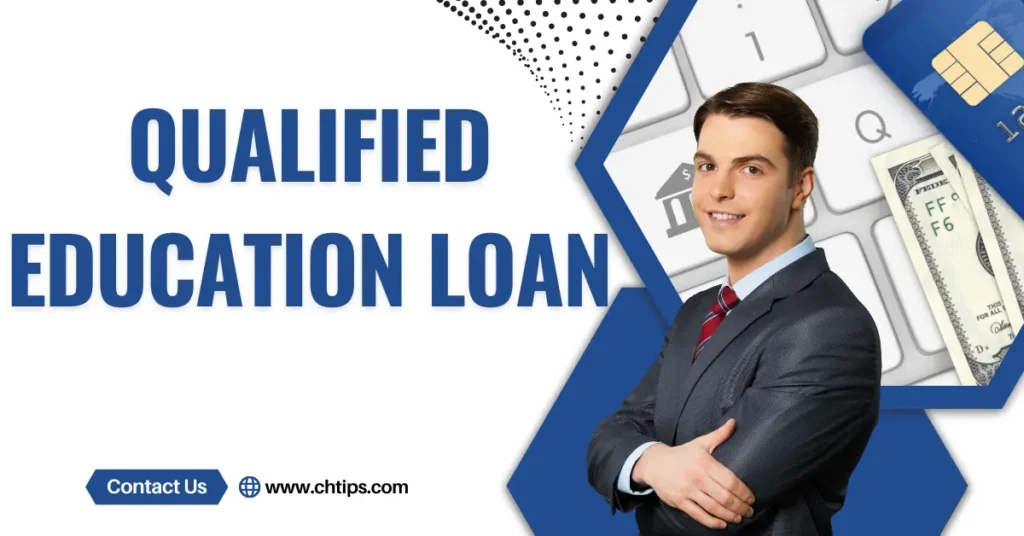Introduction Qualified Education Loan
Quality educational loans or lenders act as a bridge between students and education. Students and their family members who need financial help to pursue their educational goals can opt for this sort of loan.
These loans cover all education expenses, such as tuition fees, college fees, books, stationary, etc., at any college, university, or institute, locally or abroad.
Lenders require certain terms and conditions to obtain qualified education loans, such as student status, age, purpose, previous education, and the prospects of the college to which you are going to apply.
These loans are easily payable with low-interest rates and with other tax benefits.
What is a Qualified Education Loan?
A qualified education loan is a type of education loan or financial assistance given to students who want to pursue higher education in their local college or abroad.
This loan is specially designed to serve students and their families so that they can brighten their future after getting a higher education by getting a job or starting a business.
This loan can take care of all the expenses related to academics like tuition fees, stationery, accommodation, college fees, etc.

There are various key features and characteristics of qualified education loans, some of which are mentioned below.
- Purpose.
- Eligible Expenses.
- Tax Benefits.
- Federal and Private Options.
- Loan Repayment.
1. Purpose.
Education loans are only offered to students who want to pursue their higher education locally or abroad. Education loans can be acquired for vocational courses or professional courses.
These education loans are strictly for educational purposes. People who submit requests other than for education will be outrightly rejected.
2. Eligible Expenses.
Education loans are used to pay expenses like college or university tuition fees and all other expenses related to education.
3. Tax Benefits.
Taking a qualified education loan has several benefits, but one of the most significant is the tax benefits and tax rebates it offers.
For example, borrowers may be eligible to deduct the interest paid on these loans from their taxable income, potentially reducing their overall tax liability.
4. Federal and Private Options.
Qualified education loans can be obtained through private and government agencies or lenders.
5. Repayment Options.
Most qualified education loans offer flexible repayment options, including deferment and income-driven repayment plans. Some loans may also offer forgiveness programs for borrowers who work in certain public service fields or meet other eligibility criteria.
Types of Qualified Education Loan
- Federal Student Loans.
- Direct Subsidized Loans.
- Direct Unsubsidized Loans.
- Direct PLUS Loans.
- Private Student Loans.
- State-Based Education Loans.
- Institutional Loans.
- Parent Loans for Undergraduate Students (PLUS Loans).
Related Articles
- How to Choose a Solar Installer to Finance B2B
- 4 Types of Finance With Examples
- 7 Powerful Startup Business Loan For Women Entrepreneurs
- What is Fund Finance Investment Banking
- What is Commercial Distribution Finance | 5 Different Types
- Differences Between Student Loans and Education Loans
- Discover 7 Ways: How to Get the Lowest Interest Rate Loan
- Debt Consolidation Loan: Top 7 Solutions to Streamline Your Finances
- Can You Get a Personal Loan For a Lawyer
- How to Get a Mortgage Loan & Secure Your Home
- How to Get An Education Loan For MBA
- A Practical Guide to Quantitative Finance
- Where to Finance a ps5
- Computer Basic Tutorials
Education Loan Requirement | Eligibility
The education loan requirement depends completely upon the lenders who are providing the loan to the students. The majority of the requirements for all lenders are the same.
Below, I have mentioned some of the common requirements.
- Student Status.
- Student Age.
- Citizenship or Residency.
- Creditworthiness.
- Enrolment in an Eligible Program.
Useful Video: Qualified Education Loan
Qualified Education Loan PDF Download
| Download Here |
Frequently Asked Questions [FAQs]
What are the benefits of a qualified education loan?
1] Low Interest Rate.
2] Quick Disbersment.
3] Potential Tax Deductions.
4] Flexible Repayment Options.
How do I apply for a qualified education loan
Free Application for Federal Student Aid (FAFSA) Submit Your Data Here.
What are the repayment options for qualified education loans
Standard repayment plans, extended repayment plans, income-driven repayment plans, and loan forgiveness or discharge programs for eligible borrowers
Can I use a qualified education loan to cover living expenses
No, education loans are obtained only for education purposes.
Get In Touch
A qualified education loan is a financial help and assistance given to aspiring students who want to pursue their education career and take higher education.
To continue their academic journey, students can make intelligent decisions while choosing qualified education loans, making sure about their features, characteristics, and advantages over one another.
Students can have this loan for a brighter future and make themselves and their families financially independent after completing higher education and acquiring a handsome job or even starting their own business.
I have also written and compiled some articles on computers and telecommunications, and please go through them.
I hope you will like reading it.
Here, we answer all the questions and queries related to What is a Qualified Education Loan.
If you have any questions about the Qualified Education Loan.
Don’t hesitate to contact me, and if you feel to add, remove or update anything from the article, please let me know in the comment section or via email.
I will be more than happy to update the article. I am always ready to correct myself.
Please share this article with your friends and colleagues; this motivates me to write more related topics.
!!! Thank You For Reading !!!
